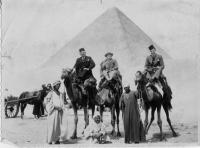It is true that, in matters artistic in which he had been concerned, Buchman was both sensitive and rigid at the same time. He was an artist and felt he knew what was right. He did not encourage adaptations in the style or covers of books in different countries, for example. This may have suppressed local talent from time to time, or even affected sales.
Tournier's diagnosis of this facet of Buchman's character was, 'He never drew people to himself, but he was authoritarian.' Cuthbert Bardsley, a close colleague for some time and one of several who later became bishops, remarked, 'His word went, woe betide you if you crossed swords with him. On the other hand, he kept the Oxford Group together - not an easy thing with such a widely divergent group of people. He had to keep discipline and if you do that you have to exert some pretty heavy authority.' Paul Hodder-Williams' view, on a shorter active acquaintance, was, 'He held together a team of very different people on a very loose rein.'

John Wesley, who was known as 'Pope John' by his foes and not a few of his friends, once said, 'Several gentlemen are much offended at my having so much power. My answer to them is this: I did not seek any part of that power. It came upon me unawares. But when it came, not daring to bury that talent, I used it to the best of my judgement. Yet I was never fond of it. I always did, and do now, bear it as my burden; the burden which God lays upon me; but if you can tell me anyone, or any five men, to whom I may transfer this burden, who can and will do just what I do now, I will heartily thank both them and you.'*
(* Once when the Labour Cabinet Minister, Herbert Morrison, questioned Buchman on his leadership, Buchman made him the same offer.)
He added, 'To me the preachers have engaged themselves to submit to serve as sons of the Gospel .. . Every preacher and every member may leave me when he pleases; but when he chooses to stay, it is on the same terms that he joined me at first.'19
With Buchman the freedom to leave was even more open to all because there was in no case any formal binding to him. If, however, anyone asked to work with him full-time and continued to do so for a considerable period, he did assume that they would work in with the strategy which he felt God had indicated to him and help to fulfil the needs of that strategy. He would suggest, ask or even command people to do this or that or go here or there. If they felt guided by God to do something different, he expected them to say so - and, generally, he would listen and reconsider. As he became older, with numbers growing and health providing other impediments, exceptions to this openness became more frequent. But in the 1930s, and on most occasions throughout his life, the basis of action was the guidance of God as sought by the individual and in groups. 'Guidance,' wrote a Danish advocate, 'meant that this manifold, intelligent fellowship functioned as one force without dictatorship or any compulsion of money or power.'20
174
Photo: On a journey in the Middle East; Buchman (left) with Lady Minto (former Vicereine of India) and Cuthbert Bardsley (later Bishop of Coventry).
©Buchman Archive/MRA Productions